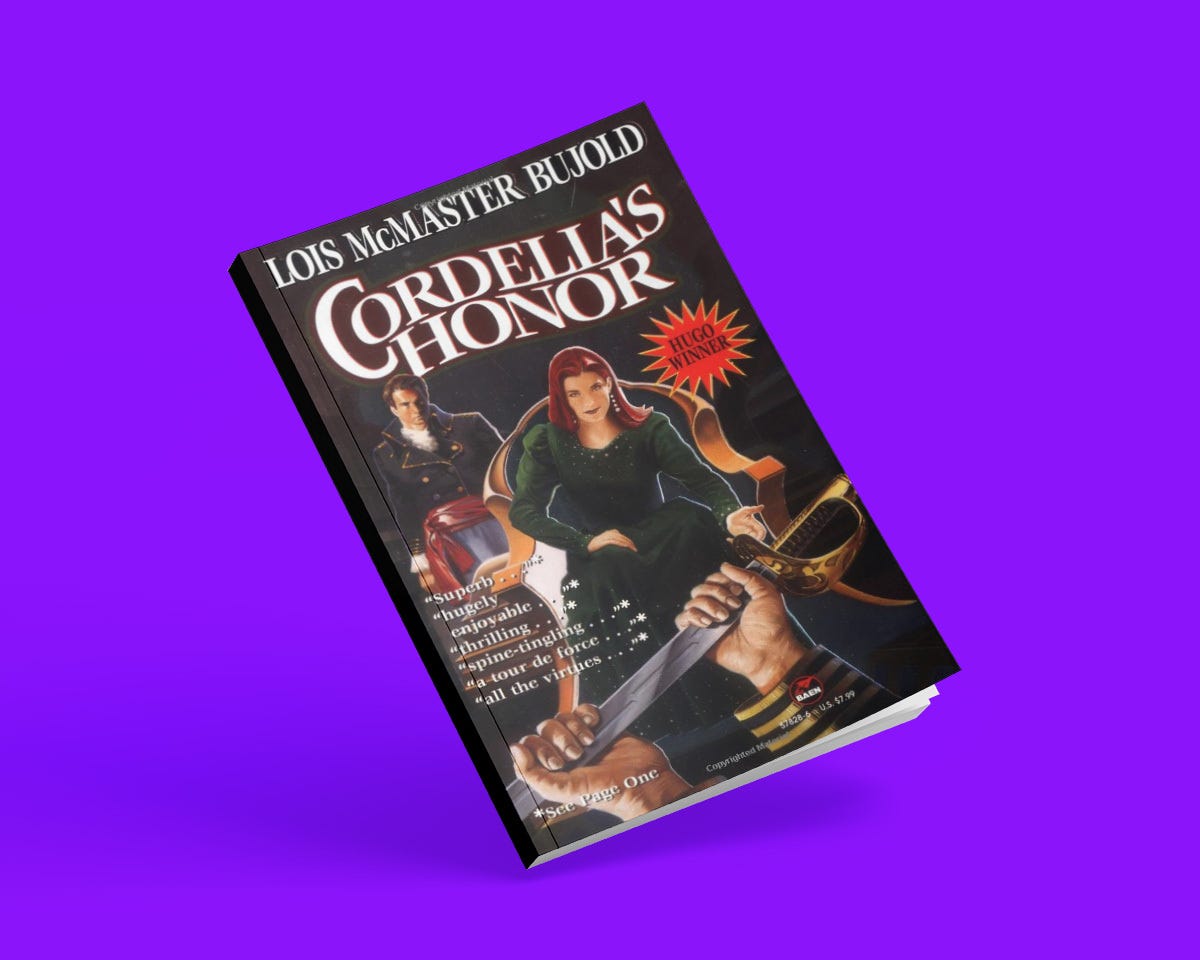Cordelia’s Honor is Thrilling, Intelligent SF from a Genre Grandmaster
This review of Lois McMaster Bujold's Cordelia's Honor is part of my ongoing initiative to archive my work at Barnes & Noble Sci-Fi & Fantasy Blog, which sadly shut down a few years ago.

"Keep your friends close, your enemies closer, and Cordelia Naismith closest of all."
Every reader has a bucket list—oft-recommended writers you keep hearing about, whose books sound absolutely perfect, but whom, for some reason or other, you never seem to get around to reading. For years, Lois McMaster Bujold’s Vorkosigan series hovered near the top of mine. The science fiction saga has been going strong for nearly 30 years, since the publication of Shards of Honor in 1986. With several million books sold, Bujold is one of the most beloved and popular science fiction authors of the modern era, and, now that I’ve finally read Shards of Honor and its sequel, Barrayar, I’m beginning to understand why—though it wasn’t my first brush with the series.
An explanation is in order. The Vorkosigan series has a number of entry points. Many readers begin with The Warrior’s Apprentice. Set 17 years after the conclusion of Barrayar, it features a young soldier named Miles Vorkosigan, and many of the characters introduced in Shards of Honor. Confusingly, it was published after the latter but before the former, which themselves were published eight years apart. Miles, the main protagonist of the series, is like an adolescent Tyrion Lannister: he’s constantly pushing against the expectations of a military society that judges him for his physical disability, and uses his wit and ingenuity to climb out of the deep holes he often digs for himself. The book is fun and quick, with a preference for dialogue over exposition, but the economy of world-building left me feeling a bit lost. With some urging from ardent Bujold fans, I retreated back a generation and picked up Shards of Honor, which focuses on the first meeting between Cordelia Naismith and Aral Vorkosigan, Miles’ parents. I immediately adored it.
Cordelia and Aral’s first meeting, as ostensible enemies stranded together on an inhospitable world, is anything but romantic, though perfectly suitable once you get to know them. During a time of upheaval and interstellar war, the two have become lofty citizens and heroes of their respective planets (Beta Colony and Barrayar) without intention nor desire to do so. While the plot revolves around an escalating war between Beta Colony and Barrayar over the planet Escobar, the bulk of the narrative, and the novel’s true strength, lies in its characters.
From the moment Cordelia Naismith is introduced, surveying the beauty of the alien planet as parlayed through Bujold’s skillful, economical descriptions, she’s impossible to dislike. Where I had a hard time connecting with her son’s larger-than-life personality, Cordelia is irresistible in the way she challenges everyone and everything—those around her, the reader, the unfair political and social standards of Barrayaran and Betan society—yet remains believable, approachable, and utterly admirable. Vorkosigan is engaging and brutally efficient, immediately piquing Cordelia’s interest, even as she’s taken aback by the situation she finds herself in. Take this brief, lovely exchange between Vorkosigan and Cordelia for a hint at why it’s so easy to feel affection for the pair:
“I…” he began, and trailed off. “You’re not what I expected a female officer to be.”
“Oh? Well, you’re not what I expected a Barrayaran officer to be, either, so I guess that makes two of us.” She added curiously, “What did you expect?”
“I’m—not sure. You’re professional as any officer I’ve ever served with, without once trying to be an, an imitation man. It’s extraordinary.”
“There’s nothing extraordinary about me,” she denied.
“Beta Colony must be a very unusual place, then.”
“It’s just home. Nothing special.” (Shards of Honor, Ch. 3)
Cordelia has a beguiling air of normalcy, always saying the right thing at the right time, taking the edge off, and making you feel good about yourself—until she commandeers your ship with nothing but a stunner, spinning in place like a cartoon coyote twirling as the roadrunner’s dust settles. She’s coy, clever, and dangerous. Keep your friends close, your enemies closer, and Cordelia Naismith closest of all.
Midway through, Cordelia, alone and imprisoned, must deal with the realities of war-time trauma when she is accosted and nearly raped by a power-hungry sociopath. It’s a startling scene, with repercussions that linger through Barrayar and The Warrior’s Apprentice, and the upheaval of her once peaceful well-ordered life is convincing and upsetting. The time Bujold spends on emotional investment early on makes us feel Cordelia’s pain and confusion in a most vivid, uncomfortable way. Post traumatic stress disorder is a very real, very debilitating aspect of war, and Bujold handles it with delicacy and respect, not only for her fictional characters, but all victims. Every action in these books has tangible repercussions, and Bujold never artificially shields her characters.
Shards of Honor exposes and analyzes our ability and willingness to look past cultural and societal dichotomies to find the underlying commonalities that draw us together, in bonds of love and friendship. It’s about loyalty—to people, to family, to values—and righteousness. Add to that a hearty dose of space battles, delightfully labyrinthine political manoeuvring, and an interesting (if small in scale) post-Earth humanity, and it solidly earns a place in the realm of excellent science fiction.
Written years later, though picking up the story just hours after the conclusion of Shards of Honor, Barrayar represents a huge leap forward for Bujold as a writer. Where The Warrior’s Apprentice and Shards of Honor show the rough edges of a youth and inexperience, this one is a tour de force—an introspective, charismatic melding of the thoughtfulness and grandeur of golden-era SF with charming characters and politics that still feel relevant and progressive even 25 years later. It deservedly won the Hugo Award for Best Novel in 1992, Bujold’s third nomination in the category, and second consecutive win (following The Vor Game).
If Shards of Honor was about loyalty, Barrayar is about change. Cordelia is thrown into the deep end as she adjusts to life on Barrayar, trying to keep afloat amid the labyrinthine, male-dominated politics of a conservative, militarized society, while also dealing with impending motherhood and the challenges of raising a child in the public eye in an unfamiliar culture. Aral, on the other hand, is reenergized by his appointment as regent, eschewing retirement as he attempts to stabilize the reeling Barrayaran government in the wake of its emperor’s death. Whatever Cordelia and Aral are apart, together they are magnificent, bouncing from ruthless to adorable. I mean, how can you resist this?
“I give you good morrow, milady,” [Vorkosigan] sang out to her, reaching for her hand. The syntax was self-conscious but the sentiment nakedly sincere in his mirror-bright eyes. In those mirrors, I am altogether beautiful, Cordelia realized warmly. Much more flattering than that on on the wall upstairs. I should use them to see myself from now on. (Barrayar, Ch. 1)
The book is most interesting in the way it plays with expectations following their happy union at the end of Shards of Honor. Cordelia and Aral are married, but forced to spend much time apart, navigating the deadly realities of their newfound authority and responsibilities (political, social, and parental). Where the danger in the first book is from their involvement in conflicts greater than themselves, the sequel is packed with direct, deadly threats the couple must navigate. It’s dangerous business, moving up in the Barrayaran political ranks. By telling the story through Cordelia’s eyes, Bujold infuses every life-or-death encounter with anxiety for the well-being of both the central couple and their unborn child, whose life is dramatically altered due to the hardships Cordelia faces during pregnancy.
Across both novels, Cordelia and Aral are surrounded by many incredible companions, including: Bothari, a once-broken soldier still healing from the effects of combat; Droushnakovi, Cordelia’s underestimated bodyguard; and Koudelka, who must come to grips with his new place in Barrayaran military society. As much as I enjoy spending time with Cordelia and her husband, it is many of these side characters that really made me fall in love with these books.
Despite my initial qualms with The Warrior’s Apprentice, after reading Shards of Honor and Barrayar, I’m thrilled to have discovered this universe, and I can’t wait to dive in deeper—and especially, to myself to young Miles Vorkosigan, who, on reflection, is the perfect mixture of his two parents. Together, these books are not only a terrific introduction to the Vorkosigan series, but also terrific entry-level SF: light on hard science, heavy on rich characters, action, and clever dialogue, Bujold’s work offers much to recommend.
Quest Markers
(Quest Markers is a collection of the coolest stuff I’ve read around the web lately.)
- How Terry Brooks Saved Epic Fantasy (Aidan Moher—Medium)
- Hayao Miyazaki’s Lost Magic of Parenthood (Uncanny Magazine)
- Art of SFF: Charles Vess on Working with Ursula Le Guin on The Books of Earthsea (Tor.com)
End Step
What's your favourite science fiction novel? Let me know on Twitter!
Support
There are lots of ways to support Astrolabe and my other work. Check ‘em out!
Keep In Touch
Enjoy Astrolabe? Want more SFF and retro gaming goodies? You can find me on Twitter and my website.
Credits
Astrolabe banner photo by Shot by Cerqueira on Unsplash

